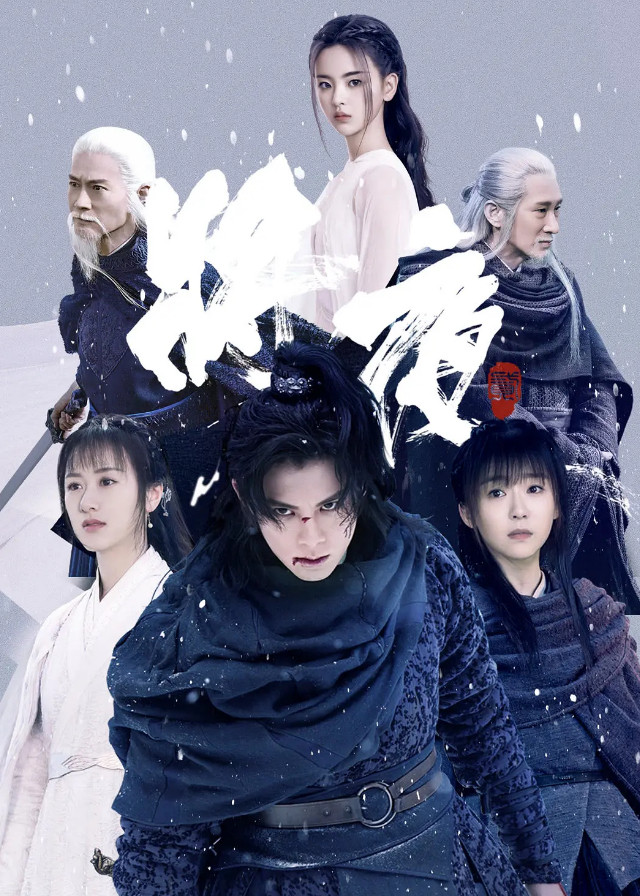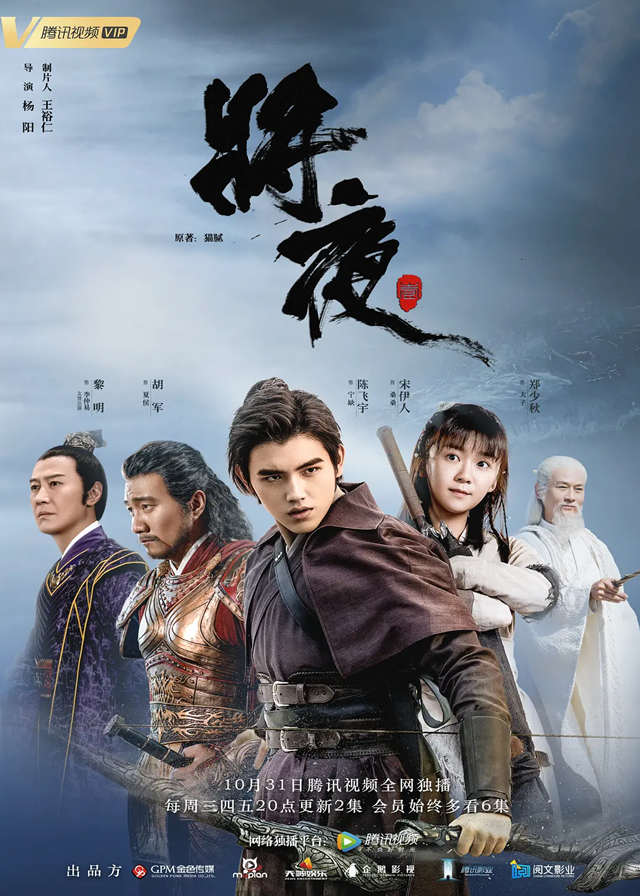Ever Night Season 2 Episode 36 Recap
> Ever Night Season 2 Recap
The peace talks between West Shrine and Tang State commenced, but West Shrine's stance remained unyielding, refusing to make any concessions. Queen Xia Tian summoned Ning Que to strategize. Ning Que suggested imposing a deadline on the negotiations to prevent West Shrine from deliberately prolonging them. Emperor Li Hupo agreed, granting West Shrine seven days, declaring that if no agreement was reached within that period, the talks would be terminated, and Tang State would be prepared for war.
Emerging from the palace, Ning Que encountered Ye Hongyu. She provocatively warned him that while he might be invincible within the capital, many would seek to kill him if he dared to venture outside its walls, suggesting he might spend his life hiding there. Ning Que, unfazed, expressed indifference. Ye Hongyu then pressed for Tang State's terms.
Ning Que laid out Tang's conditions: West Shrine's allied forces must withdraw from Qinghe County, which Tang State insisted on reclaiming, and Qinghe's warlords face Tang State's judgment. Yan State was to respectfully return the remains of the Northeast Border Army soldiers, with Chong Ming personally coming to the capital to apologize for his sins and kneel before their spirits for a night.
Ning Que also offered Tang's withdrawal from Yuelun State as a goodwill gesture, provided Pamirs were returned and Dahe State secured permanent neutrality. Ye Hongyu, in turn, presented West Shrine's demands: Qinghe County's independence, substantial war reparations from Tang State, the cession of Xiang Wan Grasslands to Golden Horde, and the "remnant of Demonic Cult" in the palace—the new King's mother, Xia Tian—must be dealt with.
Ning Que abruptly cut off Ye Hongyu mid-sentence, inquiring about Long Qing's current state and telling her not to have "wishful thinking." He then dismissed her, effectively ending their conversation. Upon returning to report to Xia Tian and Li Hupo, Ning Que acknowledged that most terms were negotiable, but the cession of Xiang Wan Grasslands remained a contentious issue.
He boldly proposed accepting West Shrine's demand, pledging as Mr. Thirteen of the Academy that he would reclaim the land in the future. Minister Zeng Jing vehemently opposed such a humiliating treaty, fearing public backlash and accusations. Ning Que, however, was resolute, viewing the potential shame as a catalyst for courage and anger. Xia Tian, concerned, wondered why West Shrine hadn't explicitly stated their most "fatal condition."
Ning Que revealed his relief that he had prevented Ye Hongyu from explicitly demanding Xia Tian's death, as that condition would have caused irreparable turmoil within Tang State. Meanwhile, the Drinker arrived at the capital, driving a carriage, and loudly demanded to see Ning Que, claiming he had a message from Heavenly Maid. Upon learning of his arrival, Jun Mo and Slow Li were apprehensive. Jun Mo decided to confront the Drinker himself.
He sternly ordered the Drinker to leave, openly calling him a "coward" for hiding for over a thousand years. The Drinker readily admitted his cowardice but insisted on speaking directly with Ning Que to deliver Heavenly Maid's message. As Jun Mo drew his sword, Ning Que arrived, stopping the confrontation. Ning Que stated he would speak with the Drinker, but Jun Mo warned him against making concessions to such a "coward."
Ning Que invited the Drinker into the city for a chat, but the Drinker insisted Ning Que come out. Ning Que feigned timidity, refusing to leave the city, which the Drinker mocked, reminding him of his past bravery. After some verbal sparring, the Drinker launched a magical attack. The Drinker then told Ning Que that neither Sage nor Chen Mou could change the world, urging Ning Que to give up.
Ning Que questioned why the Drinker, who with the Butcher had survived the last Eternal Night and thus seemed immune to Haotian, had now appeared. The Drinker admitted that Heavenly Maid had found him and the Butcher. He confessed that he could no longer distinguish between dream and reality, having witnessed a terrifying vision, explaining that while Haotian couldn't find them from the heavens, once she descended to the human world, there was nowhere left to hide.
He then delivered Heavenly Maid's message: "All the death in the world is a reunion after a long separation." Ning Que recognized this as something Sang Sang had once said. After handing over the carriage, the Drinker vanished, leaving Ning Que to muse on the return of the carriage, wondering if Sang Sang would also return. Ning Que confronted Ye Hongyu, accusing West Shrine of using the Drinker and Butcher as a blatant threat to Tang State.
Ye Hongyu retorted, calling Ning Que shameless. She reiterated West Shrine's demand for Tang State to hand over or execute Xia Tian, the "remnant of Demonic Cult." Ning Que vehemently refused, asserting that Xia Tian, as the former Queen and protected by the Academy, would not be surrendered, and that Tang State would fight fiercely if backed into a corner.
Ye Hongyu, in turn, threatened a second "fighting against Tang State" if her demands were not met, urging Ning Que to consider the consequences given Tang's weakened state. That night, Ning Que visited Xia Tian.
She confessed her long-held fear of this day, reflecting on the tragedies that had befallen Tang State—the former king's death, Sage's ascent, the "fighting against Tang State," the peace talks, Li Yu's imprisonment, and Hunyuan's death—all of which she attributed to her identity as the Saint Virgin of Demonic Cult. Ning Que tried to reassure her. Later, Ning Que approached Li Peiyan, urging him to sign the humiliating treaty with West Shrine on behalf of Tang State.
Li Peiyan, who had previously attempted to usurp the throne, resisted the idea of becoming a historical villain. Ning Que, however, outlined the strategic necessity, arguing that Li Peiyan, who Ning Que had spared not out of mercy but as a reminder to stay vigilant, could now redeem himself by performing this "big thing for Tang State." After much deliberation, Xia Tian resolved to sacrifice herself to ensure Tang State's stability and security.
She spoke of her childhood home in the pristine North Pole, her inescapable identity as the Saint Virgin of Demonic Cult, and her weariness from constantly fleeing. Despite Ning Que's pleas for her to reconsider, Xia Tian was resolute, knowing her son, Li Hupo, had Slow Li as his teacher and Ning Que protecting him.
She declared she would not let her identity draw Tang State into another war, and it was time for her to reunite with the former king, Li Zhongyi. Ning Que tried to stop her as she leaped to her death, but it was too late. He watched, heartbroken, as she fell. Li Hupo, understanding his mother's sacrifice, vowed to uphold her and his father's legacy, managing the country without worries.
Wiping away his tears, Li Hupo rallied the civil and military officials, who pledged their unwavering loyalty and commitment to protecting Tang State. Under immense pressure, Li Peiyan reluctantly signed and sealed the treaty. Outside the palace gates, enraged citizens protested, shouting "traitor" and demanding answers for the cession of Xiang Wan Grasslands. Li Peiyan, though resentful, accepted the opprobrium, believing his sacrifice would spare Tang State from further war and allow its people to recover.
Back in his manor, overwhelmed by the unprecedented humiliation, Li Peiyan took his own life with the Sword of the Son of Heaven. The deaths of Xia Tian and Li Peiyan brought a brief period of peace to Tang State, but Ning Que was convinced that a final confrontation with Haotian was inevitable. Ning Que went to the princess's mansion to inform Li Yu of Xia Tian's death, regretting that he couldn't save her.
Li Yu smiled bitterly, reflecting that both the person she loved most (her father) and the person she hated most (Xia Tian) were now gone, along with Hunyuan, leaving her feeling there was no purpose in living. Ning Que prevented her from attempting suicide, reminding her that as a princess, she had no right to die and, crucially, that her younger brother, Li Hupo, deeply cared for her. Revitalized, Li Yu returned to the imperial palace.
Seeing Li Hupo cowering in a corner, her empathy ignited. The siblings reconciled, burying their past grievances. Li Yu willingly pledged to assist Li Hupo in governing Tang State. She publicly announced the new reign title as "Zheng Shi," and together, the royal siblings received the homage of all the civil and military officials.
















